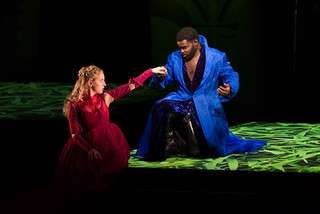|
Back
Baroque romantic entanglements Albany
Cooperstown (Alice Busch Theater)
07/15/2017 - & July 17, 20, August 1, 6, 12*, 18, 2017
George Frideric Handel: Serse, HWV 40
John Holiday, Jr (Serse), Allegra Da Vita (Arsamenes), Calvin Griffin (Elviro), Emily Pogorelc (Romilda), Katrina Galka (Atalanta), Abigail Dick (Amastris), Brent Michael Smith (Ariodates)
The Glimmerglass Festival Orchestra, Nicole Paiement (conductor)
Tazewell Thompson (director), John Conklin (set designer), Sara Jean Tosetti (costume designer), Robert Wierzel (lighting designer)

E. Pogorelc & J. Holiday, Jr. (© Karli Cadel)
Is it possible that Dr Samuel Johnson’s opinionated definition of opera as an “exotic and irrational entertainment” was sparked by Handel’s Serse? Billed as Xerxes at Glimmerglass the opera seria turns out to be not all that seria. In fact the plot resembles that of a rom-com.
The plot involves two loony sisters, sopranos Romilda (red gown) and Atalanta (green gown) both in love with Arsamenes, a mezzo playing a male role. He is the brother of Persian emperor Xerxes (counter tenor), who is in love with Romilda (as is Arsamenes). To complicate matters there is the plotting Amastis (another mezzo), once betrothed to Xerxes, who, disguised as a man, lurks about seeking an opportunity to pounce.
The plot is complicated by a purloined letter and the emperor’s insistence on speaking in riddles. There is rampant eavesdropping. Misunderstandings abound.
The opera is unusual in Handel’s operatic output (it comes near the end) in that it has few da capo arias. Thus it moves along at a faster clip than others, and the brief numbers fail to acquaint us with the characters as fully as in the more slowly unfolding works.
John Holiday, Jr. impressed two seasons ago as Julius Caesar in Vivaldi’s Catone in Utica and is, if anything, even more eloquent now. He gets to open the drama with its famous aria ”Ombra mai fù” addressed to a plane tree. The flurry of short arias that ensue in Act I don’t give him much expressive scope, but the second act has more ruminative numbers as he (like the other four lovelorn characters) analyzes and expresses his changing moods.
The romantically entangled threesome (sopranos Emily Pogorelc and Katrina Galka, mezzo Allegra De Vita) all vividly present their characters and prove to be marvelously adept with the music’s considerable demands.
In addition to the five high-voice roles there is a bass, Ariodates, father of the sisters, who rejoices that a daughter will marry the emperor, although neither does; and a bass-baritone, Elviro, a comic servant who gets to observe and enjoy the romantic entanglements of his social betters. The work is basically a throwback to 17th-century Venetian works where the serious aristos and deities are subjected to comment by their social inferiors to the delight of the audience. Young Artist Calvin Griffin, who has a seriously superb voice, displays a relaxed charm and humour amd makes Elviro the opera’s best role. He actually shows off two voices, a second one more rustic when he has to pretend to be a flower seller.
Abigail Dick as the cross-dressing Amastis vocalizes the role very nicely but one wished for a more dramatic edge - after all, she is an obsessed stalker - and in the end (amazingly enough) is successful.
Nicole Paiement, with the assistance of a four-member continuo, does a fine job of creating the appropriate Handelian sound with the festival’s malleable orchestra.
John Conklin’s set comes apart at the seams and keeps reconfiguring itself, thus giving a visual counterpart to the characters’ shifting stances. By the end the glittery tree is hanging upside down. Sara Jena Tosetti’s costumes are a match for the music’s vibrance.
The festival’s previous Handel opera was Tolomeo (fondly remembered) in 2010. Their first such foray was in 1995 (with Tamerlano). This is their ninth Handel opera. Each work poses it own set of problems to solve. We look forward to a tenth.
Michael Johnson
|